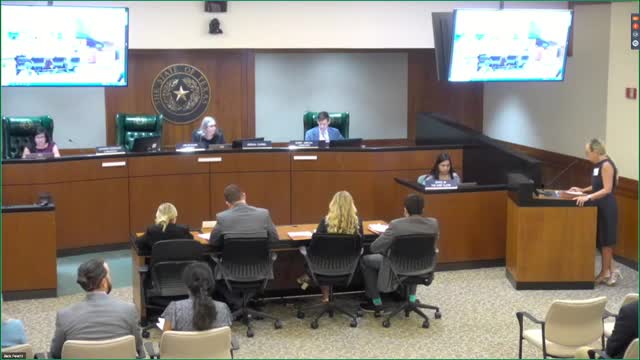Texas Commission Approves Controversial Wastewater Permit Amid Protests
August 01, 2024 | Commission on Environmental Quality(TCEQ), Departments and Agencies, Executive, Texas
This article was created by AI summarizing key points discussed. AI makes mistakes, so for full details and context, please refer to the video of the full meeting. Please report any errors so we can fix them. Report an error »

In a recent government meeting, officials discussed the approval of a Texas Pollutant Discharge Elimination System (TPDES) permit for Highland Lakes Midlothian 1 LLC, amidst significant opposition from local municipalities. The administrative law judge (ALJ) recommended granting the permit, asserting that it meets all applicable water quality standards. However, representatives from Ellis County and the cities of Waxahachie and Midlothian expressed concerns over potential negative impacts on local water quality due to the proposed wastewater discharge.
The ALJ's findings indicated that the permit application was properly noticed and that the proposed discharge would not violate state or federal regulations. The executive director of the Texas Commission on Environmental Quality (TCEQ) supported the ALJ's conclusions, emphasizing that the draft permit is protective of human health and the environment.
Opponents of the permit argued that the modeling used to assess water quality was flawed, claiming it did not accurately represent the conditions of the local stream. They contended that the data collected by their expert was insufficient and did not reflect the worst-case scenarios for water quality, particularly regarding dissolved oxygen levels.
The discussion also touched on the issue of contaminants of emerging concern (CECs), which the protestants claimed should be monitored. However, the commission clarified that there are currently no regulations governing CECs under the TPDES program, and thus, the issue was deemed irrelevant to the permit decision.
Ultimately, the commission moved to adopt the ALJ's proposed order with some modifications, including the removal of findings related to CECs, affirming that the permit would be issued as recommended. The decision reflects ongoing tensions between local growth and environmental protection, as communities grapple with the implications of new developments on their natural resources.
The ALJ's findings indicated that the permit application was properly noticed and that the proposed discharge would not violate state or federal regulations. The executive director of the Texas Commission on Environmental Quality (TCEQ) supported the ALJ's conclusions, emphasizing that the draft permit is protective of human health and the environment.
Opponents of the permit argued that the modeling used to assess water quality was flawed, claiming it did not accurately represent the conditions of the local stream. They contended that the data collected by their expert was insufficient and did not reflect the worst-case scenarios for water quality, particularly regarding dissolved oxygen levels.
The discussion also touched on the issue of contaminants of emerging concern (CECs), which the protestants claimed should be monitored. However, the commission clarified that there are currently no regulations governing CECs under the TPDES program, and thus, the issue was deemed irrelevant to the permit decision.
Ultimately, the commission moved to adopt the ALJ's proposed order with some modifications, including the removal of findings related to CECs, affirming that the permit would be issued as recommended. The decision reflects ongoing tensions between local growth and environmental protection, as communities grapple with the implications of new developments on their natural resources.
View the Full Meeting & All Its Details
This article offers just a summary. Unlock complete video, transcripts, and insights as a Founder Member.
✓
Watch full, unedited meeting videos
✓
Search every word spoken in unlimited transcripts
✓
AI summaries & real-time alerts (all government levels)
✓
Permanent access to expanding government content
30-day money-back guarantee

